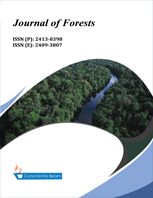Analysis of Arable Farmers Agroforestry Practices in Bokkos Local Government Area, Plateau State, Nigeria
DOI:
https://doi.org/10.18488/journal.101.2021.82.161.170Abstract
The need to increase arable crop production to keep pace with food demands for a growing population without degrading ecosystems can only be achieved through adoption of agroforestry. Agroforestry practices help to achieve food security, biodiversity, conservation and land sustainability. The 94 famers were chosen using a multistage sampling process. Descriptive and inferential statistics were used to analyze the data. Most (74%) of respondents practiced home gardening. The significant benefits derived from agroforestry were; food/fruits (97%) and soil improvement/conservation (88%). The mean adoption index was 0.27. The log-likelihood obtained from Tobit was 67.92 indicating that the independent variables significantly explained the variation in the farmer’s adoption decision. Educational level (β=0.426) and farm experience (β=0.597) were both positive and statistically significant at ρ˂0.05; farm income (β=0.568) was significant at ρ˂0.01, and extension contact (β=-0.887, ρ˂0.01) was negative and had a negative impact on agroforestry adoption. The constraints affecting the practice of agroforestry among arable farmers were; poor policies, inadequate extension services, insufficient improved tree species among others. The study recommends intensification of extension services and provision of incentives to farmers to promote agroforestry adoption to achieve increased food production and sustainable land-use systems.

